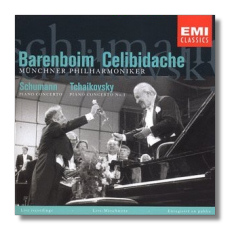
The Internet's Premier Classical Music Source
Related Links
- Latest Reviews
- More Reviews
-
By Composer
-
Collections
DVD & Blu-ray
Books
Concert Reviews
Articles/Interviews
Software
Audio
Search Amazon
Recommended Links
Site News
 CD Review
CD Review
Schumann / Tchaikovsky

Piano Concertos
- Robert Schumann: Piano Concerto
- Piotr Ilyitch Tchaikovsky: Piano Concerto #1
Daniel Barenboim, piano
Munich Philharmonic Orchestra/Sergiu Celibidache
EMI Classics 557417-2 DDD 72:26
When two musicians like Barenboim and Celibidache get their collective hands on warhorses like these, it's predictable that the results, whether or not they are wholly successful, will challenge listeners to rethink what they know about this music. In truth, these probably are not ideal interpretations of either work, but they do make us hear the music through different sets of ears.
Barenboim was seven when he first played for the Romanian conductor, and they collaborated frequently during the last years of Celibidache's life, when "Celi" was the conductor of the Munich Philharmonic. The performances offered here were recorded live in July and October 1991, respectively. By this time, Barenboim's career as a conductor had overshadowed his career as a pianist, so it is that much more notable that he regularly stepped into the soloist's role when Celibidache was his partner. There's certainly nothing "rusty" about his playing here!
Celibidache, of course, has been dead for several years, but Barenboim fortunately is still very much with us. In the booklet note, the pianist mentions a sense of "one-ness" when playing the Tchaikovsky with his mentor. Also, "if you were on the same wavelength as him musically, he gave you an amount of freedom to play that was very unusual." Relatively few of Celibidache's concerto recordings have been made available. Apart from the present one, there's a Dvořák Cello Concerto with Jacqueline du Pré, who was Barenboim's wife. Coincidence?
Celibidache's predilection for slow tempos is apparent on this CD, but not to the extent heard in many of his other Munich performances. Including applause, the Schumann is almost 35 minutes long; the Tchaikovsky is almost 39. Barenboim, who often collaborated with "slow" conductors when he was younger, seems comfortable with the maestro's basic tempos, but not with his flexibility of phrasing. It's almost as if youth were trying to bring discipline to old age. While the result isn't really tense or confrontational, it isn't exactly an example of "one-ness" or being "on the same wavelength." Nevertheless, slight differences of opinion (as long as they are not as marked as Gould versus Bernstein, for example!) can lead to insight. At a good public debate, one learns from and, to an extent, agrees with both sides, and so it is with these performances.
The quality of the sound is excellent. Now I am wondering what other Celibidache surprises EMI might have waiting for us?
Copyright © 2003, Raymond Tuttle


















